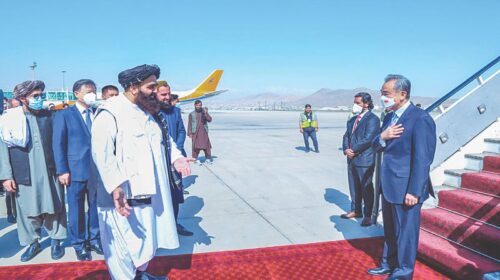Beijing welcomes Afghanistan’s active participation in the Belt and Road Initiative, a global infrastructure plan proposed by China, and is willing to push for extending the China-Pakistan Economic Corridor (CPEC) to Afghanistan, Chinese Foreign Minister Wang Yi said on Thursday as he made a surprise visit to Kabul.
Wang met acting Afghan Foreign Minister Amir Khan Muttaqi to discuss political and economic ties, including starting work in the mining sector and Afghanistan’s possible role in China’s Belt and Road infrastructure initiative, according to a statement from an Afghan foreign ministry spokesman.
China was willing to promote the extension of CPEC to Afghanistan, making the latter a bridge for regional connectivity, Wang said on Thursday .
He also said China hoped Afghanistan would fulfil its commitment of not allowing any external forces to use its territory as a tool to oppose neighbours, or harm the security of other nations.
Wang visited Kabul on Thursday, a spokesman for Afghanistan’s foreign ministry said, the highest-level visit by a Chinese official since the Taliban took power last year and a day after many in the global community were angered by the group’s closure of girls’ high schools.
China is among just a handful of countries, including Pakistan and Qatar, that has sent a minister to Afghanistan since the Taliban took over the country in August.
Foreign governments, including Beijing, have held back on formally recognising the Taliban administration, with many saying the Taliban need to prove their commitment to human rights, counter-terrorism and inclusive governance.
The visit came after widespread global condemnation of the Taliban administration a day earlier, when it unexpectedly ordered girls home from high school, an abrupt U-turn on policy after having said earlier in the week school would be open to all students.
China will host a meeting of regional foreign ministers later this month, and the statement said Muttaqi would also participate in the meeting.
Earlier in September, Pakistan also discussed Taliban-led Afghanistan joining the multibillion-dollar CPEC infrastructure project.
“Regional connectivity is an important element of our discussion with Afghan leadership and our way forward for our economic interaction with Afghanistan,” said Mansoor Ahmad Khan, Pakistan’s envoy to Kabul, in an interview with Reuters at the time.
“This important project — China-Pakistan Economic Corridor … provides good opportunities, good potential for providing infrastructure and energy connectivity between Afghanistan and Pakistan … (and) also connecting South Asia to the Central Asian region.”
Mr Khan said that discussions had been held with the Taliban-led administration on this and other ways to develop the country’s economy.
“I think there has been deep interest in terms of developing economic connectivity of Afghanistan with Pakistan through CPEC and with other neighbouring countries including Iran, China, Central Asian countries.”
Under CPEC, Beijing has pledged over $60 billion for infrastructure projects in Pakistan, much of it in the form of loans.
CPEC is a central part of China’s Belt and Road Initiative (BRI), which was launched by President Xi Jinping in 2013 with an aim to harness China’s strengths in financing and infrastructure construction to “build a broad community of shared interests” throughout Asia, Africa and Latin America.





